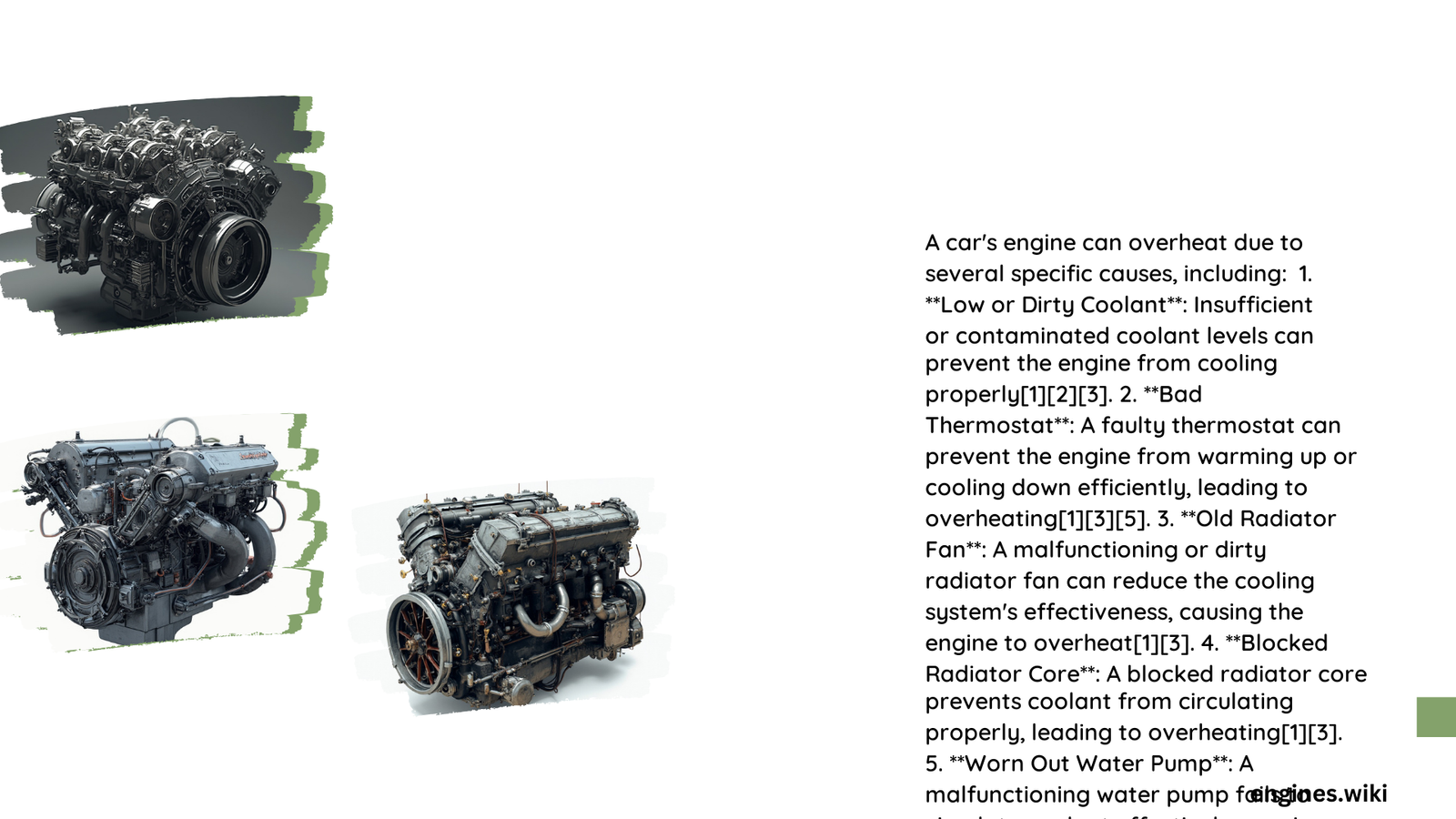Engine overheating is a serious issue that can lead to significant damage if not addressed promptly. Common causes include coolant leaks, thermostat failures, radiator blockages, and water pump malfunctions. These problems can result in rapid temperature increases, potentially reaching dangerous levels above 120°C (248°F). Understanding these causes is crucial for maintaining your vehicle’s health and preventing costly repairs.
What Are the Primary Causes of Engine Overheating?
Engine overheating can be attributed to several factors, each with its own set of symptoms and potential consequences. Let’s explore the main culprits:
How Do Coolant Leaks Contribute to Overheating?
Coolant leaks are a major cause of engine overheating, accounting for approximately 36% of cases. These leaks can occur in various components of the cooling system:
- Hoses: Cracks and splits in hoses can lead to significant coolant loss. A single cracked hose can leak up to 1 liter of coolant per hour.
- Radiator: Leaks in the radiator core or tanks can cause substantial coolant loss, leading to a drop in coolant level and subsequent overheating.
- Water Pump: Leaks around the water pump seals or gaskets can allow coolant to escape, reducing the system’s cooling capacity.
- Head Gasket: A blown head gasket can cause coolant to leak into the combustion chamber or oil passages.
- Freeze Plugs: Corroded or damaged freeze plugs can allow coolant to escape from the engine block.
The impact of coolant leaks on engine temperature can be severe. If the coolant level drops below the recommended level, the engine temperature can exceed 100°C (212°F) within a short period.
What Role Does Thermostat Failure Play in Engine Overheating?
Thermostat failure is another common cause of engine overheating. The thermostat regulates coolant flow between the engine and radiator. It can fail in two primary ways:
-
Stuck Closed: If the thermostat is stuck in the closed position, it prevents coolant from flowing into the radiator. This can cause the engine temperature to rise rapidly, potentially exceeding 120°C (248°F) in a short time.
-
Stuck Open: While less likely to cause overheating, a thermostat stuck in the open position allows continuous coolant flow. This can prevent the engine from reaching its optimal operating temperature, leading to poor performance and reduced fuel efficiency.
The lifespan of a thermostat can vary widely depending on the vehicle model and usage. On average, thermostats can last between 50,000 to 200,000 miles before requiring replacement.
How Can Radiator Blockages Lead to Engine Overheating?
Radiator blockages can significantly impair the cooling system’s efficiency, leading to engine overheating. These blockages can occur due to:
-
Debris Accumulation: Dirt, leaves, or even plastic bags can block airflow through the radiator, preventing effective heat transfer from the coolant.
-
Internal Corrosion: Over time, corrosion within the radiator can reduce its efficiency and obstruct coolant flow.
The effects of radiator blockages can be quantified:
- A 20% blockage in the radiator can reduce coolant flow by up to 30%.
- This level of blockage can increase the engine temperature by 10-20°C (18-36°F) within a short period of driving.
What Impact Does Water Pump Malfunction Have on Engine Temperature?
The water pump is crucial for circulating coolant throughout the engine. A malfunctioning water pump can lead to rapid overheating:
-
Corrosion and Wear: Rust and corrosion can cause small holes in the water pump, reducing its efficiency. Common symptoms include high-pitched sounds from the front of the motor and coolant leaks.
-
Reduced Pumping Efficiency: A failing water pump can significantly decrease coolant flow rate. For instance, if the pump is operating at only 50% efficiency, it can cause the engine temperature to rise by 20-30°C (36-54°F) within minutes.
What Are the Key Statistics on Engine Overheating Causes?

To better understand the impact of various factors on engine overheating, let’s look at some key statistics:
| Cause | Contribution to Overheating | Temperature Impact |
|---|---|---|
| Coolant Leak | 36% of cases | Can exceed 100°C (212°F) rapidly |
| Thermostat Failure | Common cause (% not specified) | Can exceed 120°C (248°F) if stuck closed |
| Radiator Blockage | Significant cause (% not specified) | Can increase by 10-20°C (18-36°F) |
| Water Pump Malfunction | Critical cause (% not specified) | Can increase by 20-30°C (36-54°F) if efficiency reduced by 50% |
How Can Engine Overheating Be Prevented?
Preventing engine overheating involves regular maintenance and prompt attention to warning signs:
- Regular Coolant Checks: Inspect coolant levels and quality regularly, topping up or replacing as needed.
- Radiator Maintenance: Keep the radiator clean and free from debris. Flush the system periodically to prevent buildup.
- Hose Inspection: Regularly check hoses for signs of wear, cracks, or leaks.
- Thermostat Replacement: Replace the thermostat according to the manufacturer’s recommendations.
- Water Pump Maintenance: Listen for unusual noises and watch for leaks that might indicate water pump issues.
- Temperature Monitoring: Pay attention to the temperature gauge and address any unusual readings promptly.
By understanding what could cause a car’s engine to overheat and taking preventive measures, you can significantly reduce the risk of engine damage and extend the life of your vehicle.
